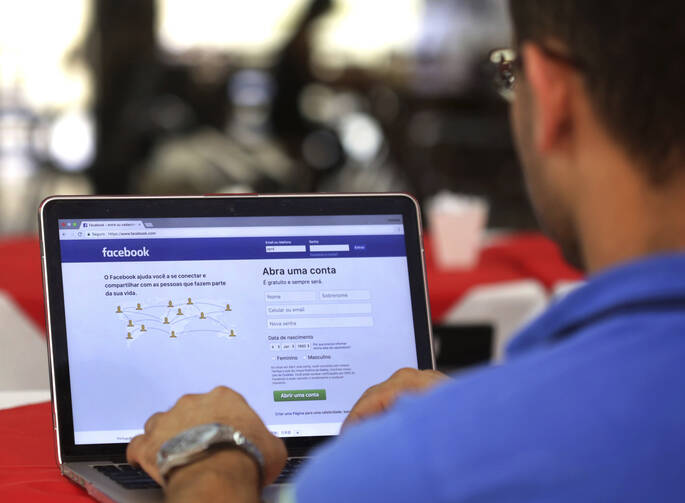As part of its attempts to address Russian interference in the 2016 election, Facebook decided last fall that any advertisement targeting one of its religion-based interest groups would be subject to human review before being accepted, with up to 24 hours before resolution. The problem, says Matt Meeks, chief digital and marketing officer for the Archdiocese of Los Angeles, is that the new policy creates serious obstacles for religious groups advertising to their communities.
Suddenly, says Mr. Meeks, the approval of religious posts is “open to human bias. And they can deny or send the post back without much of an explanation.”
Facebook’s move came after research showed that religious groups such as Christians and Muslims were among those specifically targeted by Russian actors during the 2016 campaign. As reported by The Daily Beast, pages like that of the “Army of Jesus” began by posting largely harmless devotional material. As that garnered an audience, the page gradually added false or inflammatory stories.
“Religious advertising product has to go through the human review, whereas secular advertisements do not.”
On the one hand, Mr. Meeks suspects that Facebook’s new policy will push religious institutions to emphasize more positive, less political content, and “in a sense that’s good.”
But he says it also forces religious institutions to constantly second-guess themselves. And it makes Facebook seem discriminatory: “Religious advertising product has to go through the human review,” notes Mr. Meeks, “whereas secular advertisements do not.”
To be clear, any advertisement on Facebook that targets a religious-based interest group—whether it is created by the Diocese of San Diego or Gray’s Papaya—is now subject to human review. But for a secular organization, the policy might affect 10 percent of its Facebook ads; for a diocese or parish, which is almost always going to be targeting its own religious community, virtually every single ad they produce has to be reviewed.
Maybe that is not bias, but it definitely has that appearance. You don’t have to ever receive a ticket from the cop who pulls you over every time he sees you to feel you are being treated differently.
And while the 24-hour period for review hardly seems unreasonable, for a parish advertising on the feast of its namesake, or a Catholic school trying to advertise that day’s open house, the delay can make a difference. For a Catholic organization trying to raise money on Giving Tuesday, losing that day, as happened in November to Mater Ecclesiae Fund for Vocations, can be disastrous.
For a parish advertising on the feast of its namesake, or a Catholic school trying to advertise that day’s open house, a 24-hour delay can be disastrous.
Ironically, another of Facebook’s recent moves seems likely to force religious institutions into more advertising. Facing criticism that its News Feed has become disconnected from users’ actual friends and family, Facebook has announced it will change its algorithm to emphasize personal and local relationships while de-emphasizing fan pages—pages for institutions or individuals that users “like” and thereby give access to their News Feed.
In many cases that’s a good thing; the fact I once upon a time “liked” Pepsi does not mean I want to see ads from them in my News Feed. But fan pages are also the main venue that religious institutions have to connect with their communities on Facebook. Schools, parishes, dioceses and retreat centers all use them to communicate, engage and inspire. With this new algorithm, their ability to do so will be diminished.
“If you have a big Catholic Facebook page and you have big numbers,” says Mr. Meeks, “your reach [from fan pages] is going to significantly drop. The only way to reach those people effectively going forward on Facebook is to use their advertising platform.”
In some ways this, too, has an upside. “Advertising can’t be a scary thing for Catholic organizations any more,” argues Mr. Meeks. “If the church wants to have a voice in social media, they need to have an advertising budget.” But it also means even more of what religious groups do on Facebook being subject to human review.
The real problem here may be Facebook’s success. With nearly two billion users, is it even possible for the organization to understand the implications of its moves ahead of time? The flurry of recent announcements seems to suggest an institution responding on the fly, but is another way even possible?
Mr. Meeks believes that Facebook’s moves “come from a good-hearted group of people who really want to use technology to change the world. But they’re also really disconnected from that world that they’re trying to change.”
“Facebook should be an impartial technology that recognizes that religion is a part of the fabric of human existence and civic life,” he says.
This situation begs a question of religious groups, as well: How is it that religious-minded people were such ready targets for manipulation? “Russian trolls didn’t need millions to sow chaos,” was the headline on the Daily Beast story last November. “They had Jesus.”
Could there be something about how we are functioning as church in the United States that is making Catholics more receptive to hostility and division? Could the rhetorical strategies that different religious communities use to address political or social issues here be having the unintended consequence of reaffirming prejudice or discord? While pushing Facebook for fairness, it would seem people of faith also need to be putting some questions to themselves.











The interesting part is that the Russians targeted religious groups for their campaign of disinformation. Perhaps the aspect that churches need to address is the fact that their adherents are more vulnerable to disinformation. Religion cannot be so otherworldly that it loses its common sense.